BTS. Come for the melodic tracks and hypnotic dance moves. Stay for the positivity and the ‘healing’ presence of these legendary K-Pop idols. For many, the biggest band in the world are also some of the most inadvertently empowering life coaches that many will ever have access to. And we’re collectively all the better for it.
Led by RM, alongside Jin, Suga, j-hope, Jimin, V and Jung Kook, the iconic South Korean band has transcended barriers, cementing their status as not only award-winning musicians and entertainers, but role models and a positive influence for their millions-strong fan base, ARMY. So what mental health lessons can be gleamed from ‘Korea’s pride’, exactly?
BTS’ rise from rags to riches is the stuff of legend, having shared in a one bedroom apartment and training for 16 hours a day in a cramped studio until their mirrors would fog up from the lack of ventilation. But as ARMY who have laughed and cried alongside them know, their success didn’t happen overnight, culminating from years of hard work, personal sacrifice and quite literally—blood, sweat and tears from the band’s part. The fruit of their trials is best seen in the lyrics that deeply resonate with fans; and seven resilient, humble men whose characters have truly been forged in the fires of hardship and haters.
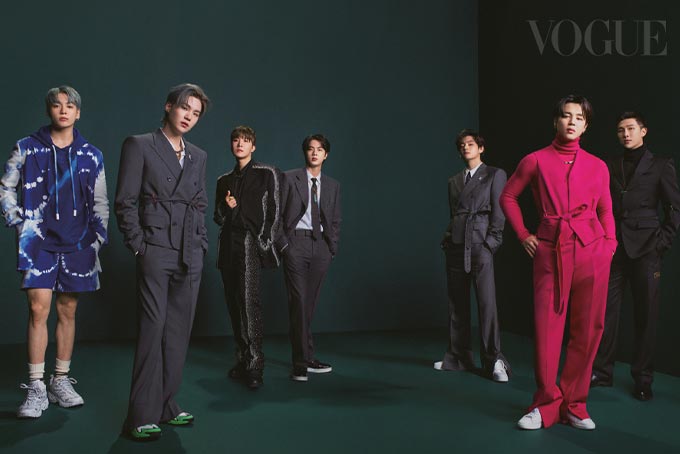
As OT7 fans of Bangtan Sonyeondan as they’re known in their native Korean, we’ve spent many an hour immersed in BTS’ decidedly hope-filled universe.
“BTS brings so much positivity, joy and inspiration. I feel a unique sense of connection when ARMYs all over the world also enjoy their music and content,” shares Singaporean sales director, Michelle Ong. As for what makes a positive mental health influence, Ong says, “I think it is largely because of their talent, personalities and authenticity too; even though BTS is globally successful now, they are still humble and hardworking human beings who continue to show their heart.”
For many including Malaysian entrepreneur Sheena Teo, BTS has seen its fans through some dark days.
“BTS reminds me that loving yourself is an ongoing, sometimes fraught journey and I think their earnest, hopeful message has been exactly what so many of us needed during these uncertain times,” says Teo.
“I can’t stress enough how much BTS has impacted not just my life, but the lives of the young people I work with,” shares Canadian social worker, Mae Facundo. “Indigenous people are the most at-risk demographic here in Canada, and in my caseload alone, I have met five ARMYs. BTS have kept these youth alive—they have gone through every kind of trauma you could think of and then some. I’ve used BTS as a way to build rapport and sometimes, if I didn’t have that connection, I truly don’t know what I would do to form a meaningful relationship with them. I just hope they know one day how incredibly powerful and life changing them and their music are.”
“They make me laugh—that makes them the best medicine, the antidote to stress and bad days,” explains writer and mental health advocate, Karman Tse. “They keep showing us that it’s okay to be, to express, and love not only the ‘best’ but all versions of ourselves, no matter who we are in the world, walking the talk as perhaps the most persuasive and powerful ambassadors of self-love right now.”
Vogue Singapore unpacks just some of the reasons why BTS are the mental health mentors society needs right now.

1 / 13
It all begins with loving yourself
BTS’ core message is of self-love. But what does it truly mean to love yourself, and in a deeper, more intentional way that’s more boundaries-than-bath bombs?
“Loving myself might be harder than loving someone else. Let’s admit it, the standards you made are more strict for yourself. The thick tree rings in your life, it’s part of you, it’s you. Now let’s forgive ourselves. Our lives are long, trust yourself when in a maze. When winter passes, spring always comes,” BTS’ songwriter, producer, Suga raps in Answer: Love Myself.
When BTS partnered with Unicef to launch its Love Myself campaign, leader RM shared, “We thought that love, the real meaning of it, starts with loving ourselves and accepting some ironies and some destinies that we have from the very start… Instead of preaching or [giving] orders, we committed to loving yourself and that’s why I started with ‘I’m just an ordinary boy from a city near Seoul in South Korea’ at our U.N. speech.”
In Cypher 4, he asserts: “I love, I love, I love myself. I know, I know, I know myself.”
“When it comes to loving yourself, I think it’s about asking yourself a lot of questions and learning more about who you are. I think that’s the foundation and beginning of learning to love yourself,” Jimin shared in BTS’ Break the Silence documentary.
EXPERT’S TAKE: Hardwick shares, “to know yourself is to know that you already love yourself. You can, however, think yourself away from the feeling of self love. In my professional opinion it is remembering rather than learning. No one has to teach young children how to love themselves. It is already built in.”
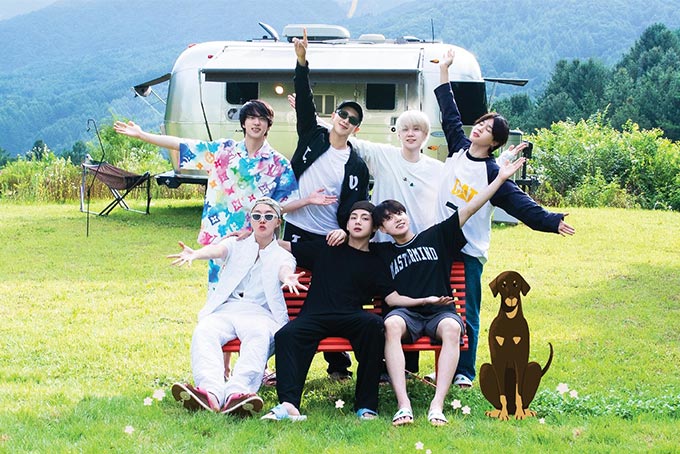
2 / 13
You don’t need to earn your rest
Here’s a revelation for those who have bought into the trap of today’s hustle culture: True rest isn’t productive and nor does it need to be earned.
In an episode of BTS’ reality series, In the Soop 2 where we vacationed with the group, Jin says, “To me, resting is not putting meaning into time spent for self-improvement. Laying down all day or gaming all day. We live in a time where when I say gaming is my hobby, many ask why I’d do that. They instead suggest I be more productive by working out or doing something to develop my career. They often say things like “Find a hobby.” But I wonder is, that really ‘rest.’ You know, those days when you’ve done absolutely nothing, that people might look at you and say, “You wasted your day away.” That’s the kind of living that gives me rest.”
As Jin shares in Vogue Singapore’s January/February 2022 ‘Grace’ issue, “The meaning of the word ‘rest’ seems to have changed. I think that resting should be entirely selfish. However, a lot of people try to do something useful in their free time, like something that will help them pad out their résumé. But I believe that uselessness is useful! I believe that you need to have days that other people consider wasteful, to be able to focus more on useful things later.”
EXPERT’S TAKE: Tying your productivity and output to your worth is one of the fastest ways to burnout and create resentment towards your passions and career. Instead, take rest for what it is. A chance to recoup and rebalance the mind and body. This rest needn’t be productive either. You don’t need to use your rest to learn a new hobby or upgrade your skills. Rest can just be that: rest.
“It can be easy to be lured into the myth that the more productive you are the better your life will be. This is untrue. Spending time ‘doing nothing’ is a great way to reconnect with yourself, restore resilience and be the ultimate source of productivity,” explains Stephanie Hardwick, life and leadership coach with a Master’s in Applied Behavioral Science, Systems Counselling. Hardwick, who has been a devoted US-based ARMY since 2020 also runs the viral TikTok account sharing why BTS is good for your mental health.
“Something I always tell my clients, co-workers, and myself is that when you give, give and give—you yourself are left with very little. Rest and self-care is crucial to fill your cup in order to show up for others and most importantly, yourself,” says Mae Facundo, a social worker who closely works with Indigenous youth in the Canadian foster care system.

3 / 13
You define you
Eleanor Roosevelt said, “No one can make you feel inferior without your consent.” BTS collectively declared in their 2015 rise-and-grind hit, Dope: “I reject rejection.”
In Idol, RM and dance leader j-hope rap, “You can call me artist. You can call me idol. No matter what you call me, I don’t care. I’m proud of it. I’m free. No more irony. Cause I was always just me.”
Suga and RM then affirm, “They point fingers at me, but I don’t care at all. Whatever the reason for your criticism is, I know what I am. I know what I want. I never gon’ change. I never gon’ trade.”
In explaining the Korean meaning of BTS’ name, Bangtan, j-hope one shared: “‘Bangtan‘ means to be resistant to bullets, so it means to block out stereotypes, criticisms, and expectations that aim on adolescents like bullets, to preserve the values and ideal of today’s adolescents.”
EXPERT’S TAKE: “You are free to perceive yourself in any way you choose,” Hardwick reminds us. “It is critical to your wellbeing and peace of mind that you realise your value is innate, built into you and not determined by the opinion of other people.”
“In my work, I advocate for young people facing barriers to advocate for themselves. Their past, life circumstances, and traumas do not define them, but rather their resiliency despite it all, which is what truly matters,” says Facundo.

4 / 13
Mental health is health
Your mental health is as vital as your physical wellbeing.
Suga who has been candid with his battles with mental health, shared in interview with Rolling Stone, “People’s conditions vary day by day. Sometimes you’re in a good condition; sometimes you aren’t. Based on that, you get an idea of your physical health. That same thing applies mentally. Some days you’re in a good state; sometimes you’re not. Many pretend to be okay, saying that they’re not ‘weak,’ as if that would make you a weak person. I don’t think that’s right. People won’t say you’re a weak person if your physical condition is not that good. It should be the same for the mental condition as well. Society should be more understanding.”
Breaking through the shame and stigma of seeking treatment, Suga shared: “We feel that people who have the platform to talk about those things really should talk more, because they say depression is something where you go to the hospital and you’re diagnosed, but you can’t really know until the doctor talks to you.” Talking about depression and mental health as if it were like ‘the common cold’ helps to normalise and de-stigmatise the shame surrounding mental health treatment.
EXPERT’S TAKE: For Hardwick, “It is imperative to thriving that you understand how your mind works. When talking about mental health is as acceptable as talking about physical health we will be open to getting the help we need, educating ourselves sufficiently and respect taking care of both our minds as well as our body. BTS is leading the way in making mental health conversations a cultural norm.”
“A crucial part of my job is creating a self-care plan which includes activities my client might enjoy when feeling stressed and listing trusted individuals who they can talk to. There is no shame in being open about our mental and emotional state, because just like how we go to the doctor to take care of our physical health—talking to someone when we struggle is the same for our mental health,” says Facundo.

5 / 13
You’re allowed to be a work in progress
If there’s anyone who knows the pressures of growing up and rocketing to the top under intense public scrutiny, it’s BTS.
Change, while scary, is not always bad. In Idol, Jung Kook and V talk about reconciling their past, present and future selves, singing, “There are tens and hundreds of myself in me. I welcome another me today. After all, all of them is me.”
Their song Answer: Love Myself, also addresses the same theme: “The me of yesterday, the me of today, the me of tomorrow, I’m learning how to love myself. With no exceptions, it’s all me.”
As BTS’ vocalist, V candidly tells Vogue, “I don’t think these changes are a bad thing because I have learnt how to decide what is right for me and what isn’t.”
“There may be many bumps on the road ahead, and I may experience pain at some point, but I’m not afraid. How I proceed in those situations is the most important thing,” says V.
Even RM admits he’s not impervious to staying true to living up to the expectations of others.
“I often struggle as well. The expectations people have of me, and the pressure I put on myself, are too great. I imagine even if I work in a completely different field in the future, people will still expect me to accomplish something, and I might not be able to meet those expectations. I think I’m still going through the stage of creating a rough draft,” RM muses.
Determined as ever to continue challenging himself, Jung Kook declares: “This is the only life I’ve got, and it’s short. I want to live on my own terms… I need to keep seeking change and challenge myself.”
EXPERT’S TAKE: “There will always be challenges in life,” declares Hardwick. “Our life’s task is not to have a challenge free life but to allow the life that is occurring for us to be an invitation to learn, grow and respond with love.”
“Whenever we experience trauma and anxiety, we are usually reacting to something that happened to us in the past or experiencing an irrational fear of the future—when I’m working with my clients, it important to honour that but to also focus on the present. The present is where we have full control over our thoughts, actions, and decisions, and most importantly where we can actively grow,” says Facundo.
“BTS shows me that it’s okay to fall as long as I get up again and that gives me the courage to live as the best version of myself,” shares fan and author of Self-made: Creative Lives in Southeast Asia, Stephanie Peh.
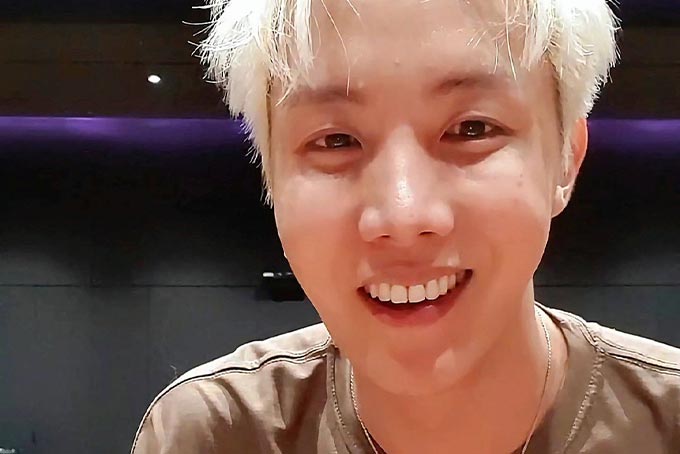
6 / 13
It’s ok to not be ok
Commonly known as the group’s happy pill, main dancer and rapper j-hope in an epic after-hours Vlive said while practicing, “I am not ok.” If the human embodiment of sunshine himself is not having such a great day, know that it’s ok be gentle on yourself if you’re doing it tough.
V on the other hand, tries to productively channel his discomfort into art, telling Vogue, “When something eats away at me, I focus on it and try to conquer it. For example, if I’m overwhelmed by some emotion, I write a song about it. When the song is done, whether it’s a good song or not, the sense of achievement helps get rid of any pain or suffering I’m going through.”
EXPERT’S TAKE: Know that it’s ok to be authentic and real about your current state, whether you’re great or in a low mood. Masking our emotions won’t serve us, but extending kindness and grace to ourselves will. In these moments talk to yourself like you would a friend and know that your ‘best’ looks different on some days.
“Understanding that you do not have to fear your experience if you are in a low mood or anxious, will allow you to be okay when you don’t feel okay,” says Hardwick.
When working with her clients, Facundo is mindful to acknowledge how they’re feeling, what they’re struggling with, and honouring them for showing up. In reassuring them that that it’s ok to not be ok, we create space for each other to be authentic with our emotions and experiences.
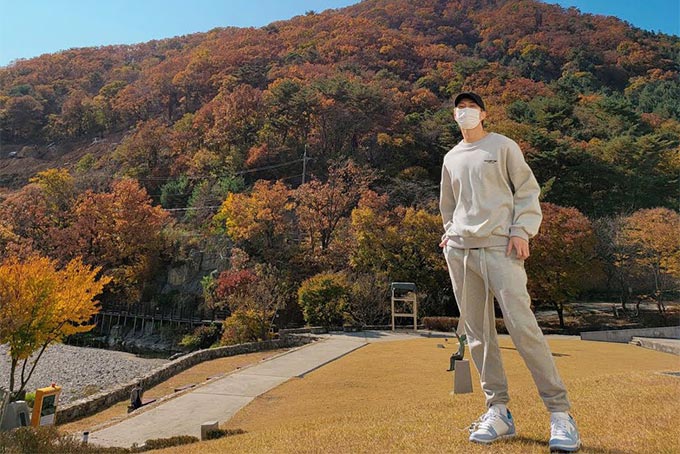
7 / 13
Nature is good for your mental health
Namjooning. Reading, biking, escaping into nature are all expert-approved ways to counter stress. In the case of BTS’ leader, Kim Namjoon aka RM, his bid to escape from the public eye led him to discover the great outdoors, in “greenery, mountains, rivers and parks.”
“People often say that being in pain is inevitable for artists, but I don’t think it’s always the case. I believe there are a lot of things that I can do that are far better.”
For RM, nature is “how I’m able to continue without going insane. I think I was able to keep going without creating some kind of public incident all because I didn’t go insane. I don’t want to make myself into a weak person, nor let fear consume me and swallow me whole. So when I go to the museum, grow plants, and ride my bike, it’s all part of a fight to keep myself from going insane.”
Jimin tells Vogue how running helps him process and cope with mental chatter: “I started running, and at first I felt like I was dying after 2.5km. But now I can run as far as 8km. The reason I got into running was that the sound of the breeze silenced my inner voice. I used to hate being alone because there were too many thoughts going around in my head, and it scared me, but now I feel I need time alone. Running helps clear my mind.”
EXPERT’S TAKE: “Studies have shown that natural settings foster a quicker recovery from stress and reconnects us with our wellbeing,” says Hardwick.

8 / 13
You deserve the love you give
“You gave me the best of me, so you’ll give you the best of you” are key lyrics from BTS’ 2018 hit, Magic Shop. The song draws key inspiration from Dr James Doty‘s best-seller, Into the Magic Shop: A Neurosurgeon’s Quest to Discover the Mysteries of the Brain and the Secrets of the Heart.
For anyone struggling with self-worth, BTS’ message is crystal clear: You matter. As they sing in songs like Mikrokosmos: “You’re a big existence. Let us shine.”
EXPERT’S TAKE: Remember the old in-flight adage of securing your own oxygen mask on before helping others?
“Your true nature is love,” Hardwick reminds us. “Be willing to give it as much as you remember. It heals the world and benefits you in the process.”

9 / 13
Success looks different for everybody
“Effort makes you. You will regret someday if you don’t do your best now. Don’t think it’s too late but keep working on it. It takes time, but there’s nothing that gets worse due to practicing. So practice. You may get depressed, but it’s evidence that you are doing good,” BTS’ ‘golden maknae’ or youngest of the seven, Jeon Jung Kook once shared.
“I understand that hard work and the outcome are two separate things,” Jung Kook or JK affectionately known to fans, explains to Vogue. “I’ve learnt how to accept the result.”
And yet, having fun and making time for play is just as essential to success as hard work. Jin, whose pearls of wisdom seem to draw directly from applied cognitive behavioural therapy, shares his healthy approach with Vogue saying, “I think having fun is one of the things that makes it possible for me to work without burning out.”
Keeping things in perspective, Jung Kook tells Vogue, “Let’s assume that what I do is art. Would this be the most important thing? Isn’t life itself more important? The time I’ve lived is distilled in me. So, life is finite but also eternal.”
EXPERT’S TAKE: “Get clear about what you want to create with your life. Focus on what you want and take inspired action. Move in the direction of your dreams and remember that your happiness is not dependent on the outcome,” says Hardwick.
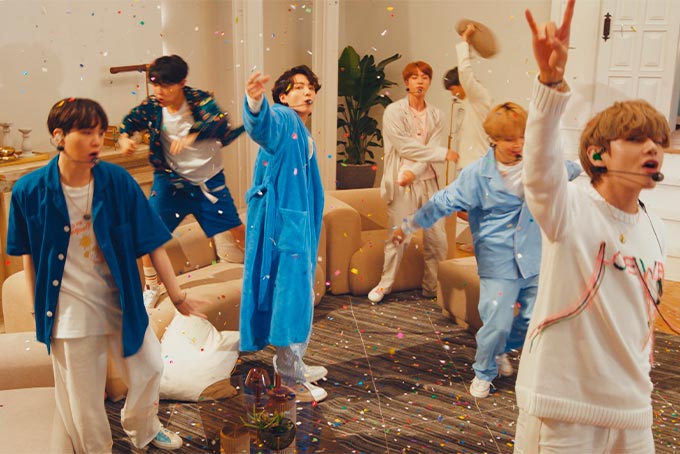
10 / 13
Know that not everyone's going to love you—and that's ok
For every 20 million likes on a BTS music video, there are invariably going to be what the K-Pop world describe as ‘antis’ who have different opinions.
“I’ve had to accept that everyone cannot love me. Because when there’s love, there’s hate. When there’s light, there’s dark. But it was really hard to accept as an artist that there’s a lot of people that hate me, but on the other side, there are many more people who love me. I think everyone goes through that,” RM once sagely shared on the duality of fame and indeed, life.
As j-hope reminds us: “When things get tough, look at the people who love you. You will get energy from them.”
EXPERT’S TAKE: “When we encounter other people we are vulnerable to being disliked or criticised. If you try to please everyone you will be living an inauthentic life based on other people’s wants and desires. Put your time and attention into the people who support you,” advises Hardwick.
“Unconditional love is a term that we often throw around without fully realising its true meaning—being loved with no conditions, and being loved exactly as you are. When I’m working with my clients, I remind them of this as they navigate life and the relationships that they begin to form all while reassuring them that they are enough and anyone who doesn’t see that, isn’t worth it,” says Facundo.
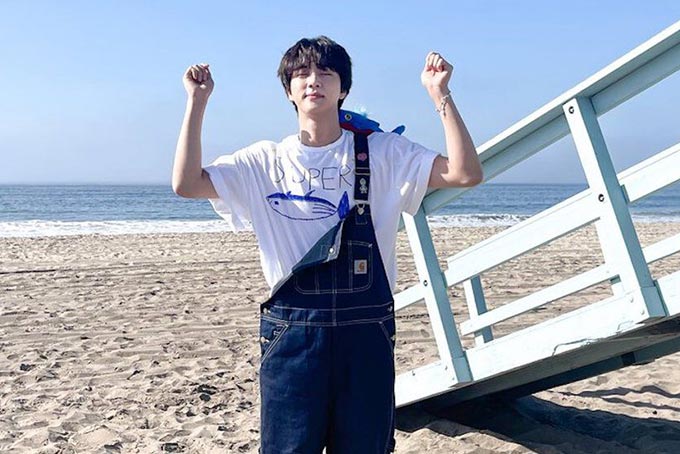
11 / 13
Break up with negativity
“Everyone is born with a certain talent, right?” Jin asked Vogue. “I think mine is the ability to quickly forget negative things that have happened and recover from mental fatigue.”
“I think it’s perfectly fine to go with the flow, rather than constantly striving and struggling all the time,” says Suga to Vogue.
EXPERT’S TAKE: “Our biggest flex as human beings is to determine the direction of our thinking. Dwelling on painful experiences will cause suffering. Being willing to focus on what is going well versus what is going wrong is good for your mental health,” says Hardwick.
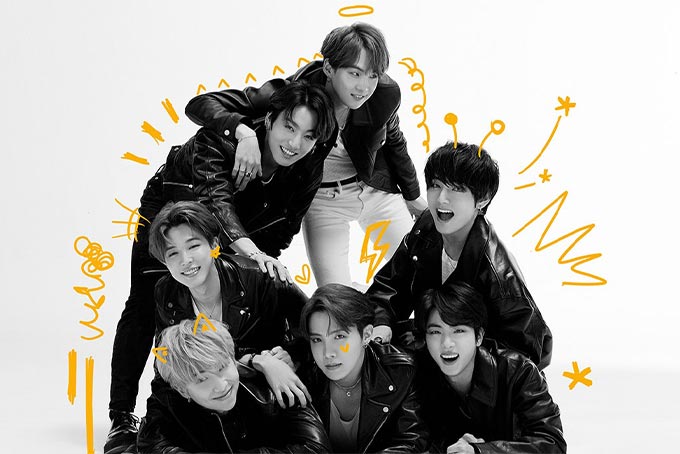
12 / 13
Enjoy the little things
Proving they’re just seven—albeit extraordinary—guys at the end of the day, BTS’ endlessly entertaining, chaos-filled variety show Run BTS pits members in competition with each other for things they perhaps value most: ramen and Korean Hanwoo beef.
“I’ve realised that happiness doesn’t require much, and it can be quite simple. I used to think material things would give me happiness, and I worked hard to achieve them. But when I succeeded, I wasn’t so sure anymore. I don’t have many earthly desires anyway,” Suga tells Vogue with a laugh.
“Perhaps it’s because I now know that material things no longer give me great satisfaction. So now, I try to find happiness in simple things, such as getting up early in the morning and having decaf coffee. I’m glad I’ve finally got to experience this kind of joy. What I lost would be being ordinary. Your ordinary is my extraordinary, right? But I think time will solve this issue.”
EXPERT’S TAKE: Hardwick recommends “taking time to appreciate simple pleasures can sooth emotional upsets, elevate mood and enhance your experience of life. There is always something to appreciate, train yourself to look for it.”

13 / 13
Remembering your ‘why’ will get you through hard times
“When there are difficulties, I ask myself, ‘What is this team for? What did we start this team for?’ and it helps me refocus. We had a hard time at first—we argued. We weren’t used to the work. But now I feel fortunate to be part of the group,” Jimin tells Vogue.
EXPERT’S TAKE: “Choosing a purpose and staying focused on it will keep you willing to work through challenges and help you navigate all difficulties that can and will arise in life,” says Hardwick.
For the full cover story, pre-order your copy of the January/February ‘Grace’ issue of Vogue Singapore





